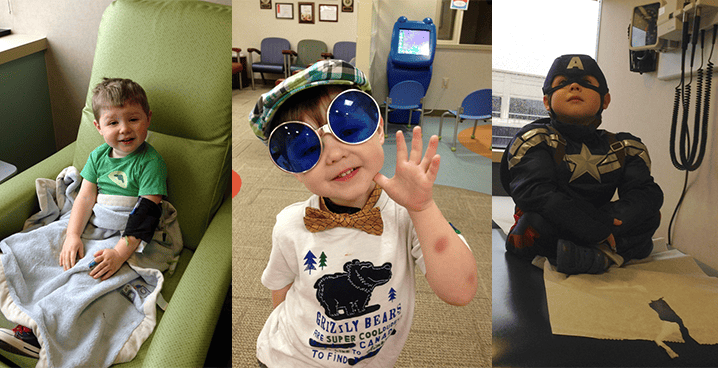In December 2012, Holly Harris was alarmed when what appeared to be red freckles appeared all over her (then 3 year-old) son, Gregory. After seeking answers from his primary care physician, a startling discovery was made: Gregory had almost no platelets in his blood. Holly was advised to transfer her son to Levine Children’s Hospital for further testing immediately. Medical specialists at the Torrence E. Hemby Jr. Pediatric Hematology and Oncology Center confirmed Gregory’s diagnosis: Idiopathic Thrombocytopenia Purpura, or ITP, a blood disorder that was causing his immune system to significantly lower the levels of platelets in his blood. Without a sufficient number of platelets, which allow blood to clot, Gregory continues to be at risk for excessive bleeding and bruising.
Three years later, young Gregory—now age 6—has not fully recovered from ITP, but receives ongoing care for his condition to keep him as healthy as possible. This is where skilled physicians, nurses, and Child Life specialists from the Torrence E. Hemby Jr. Pediatric Hematology and Oncology Center at Levine Children’s Hospital play a critical role—including that of his long-time hematologist, Dr. Chad Jacobsen.
“Dr. Jacobsen is friendly, kind, and comforting, but most of all he is knowledgeable and understanding. I immediately knew that he was the doctor we needed to help us through this journey,” comments Holly. Gregory’s condition has required many hospitalizations and weekly treatments, but Holly takes comfort in knowing her son’s medical team, who she says have become “like family”, are invested in his physical and emotional well-being.
Levine Children’s Hospital’s Torrence E. Hemby Jr. Hematology and Oncology Center has quickly become one of the top pediatric cancer and blood disorder centers in the Southeast. The Center offers state-of-the-art diagnostic capabilities and therapies for childhood malignancies and blood disorders.
With the support of the community, through charitable donations, the Center is able to grow its medical resources, recruit new physicians, and enroll patients in clinical trials (research) to improve outcomes for pediatric patients facing cancer or blood disorders, like Gregory.

